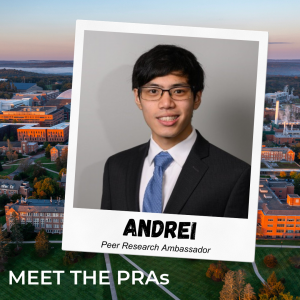Meet Andrei Abarientos ’26 an OUR Peer Research Ambassador majoring in Pathobiology.
 What is the focus of your research?
What is the focus of your research?
Here at UConn, I work on vaccine design for emerging tick-borne viruses. These include Powassan virus (which is a burden here in New England), Heartland virus, and SFTSV (a virus found predominantly in East Asia). I also did an internship with the National Institutes of Health studying tick biology: namely, how mammalian skin proteins can be inhibited by tick saliva, preventing wound closure and allowing ticks to feed effectively. My scientific interests broadly are focused on vector-borne diseases, infectious agents that can be spread by insects like ticks, mosquitoes, or fleas.
Why did you get involved in research?
I got involved in research because the act of discovery is intrinsically exciting and dynamic. It’s cool knowing that the work you’re doing is something that hasn’t been done before, and even negative results can push a project forward. It’s even more exciting knowing that work might lead to more positive outcomes in controlling infectious diseases.
What advice would you give to aspiring student researchers?
There’s this really great article called “The Importance of Stupidity in Scientific Research” (it also of course applies to humanities). My advice follows that: be okay feeling dumb or out of your scope. Feel okay not understanding a paper or getting results that are weird. It’s a part of research to be stumbling along; that’s kind of the beauty of it, in my opinion. That feeling never entirely goes away and learning to embrace it can make an experience so much more positive.
What do you enjoy the most about participating in research?
I love the collaborative aspects of research. Whether it’s reading papers, or bouncing ideas off other scientists, or presenting your work, every aspect of research is summative: you’re building off of people’s work and they’re building off of yours. There’s a stereotype about science that we’re all locked away in labs, and maybe sometimes that’s true, but really, it’s a social endeavor. Every project has been touched by many hands.
Describe the impact your research experience has had on you.
I think research has made me a lot more comfortable with failure. Seeing as things go wrong at least as often as they go right, you learn pretty quickly not just how to roll with the punches but constantly learn from them. When I started, a mistake or negative results felt so terrible. Now, I can recover a lot faster.
What is your greatest accomplishment so far?
Most of my work has been pretty preliminary, so in terms of results there’s maybe not as much, but just learning the language of a field has been so much fun. It’s so rewarding being able to talk casually with professors and even other students about your research and understand what they’re doing as well. Interning in Montana was also a high point; I’ve been a big fan of cowboys since I was a kid so it was cool seeing things like a rodeo in real life.
What are your plans after graduation? How has involvement in research influenced your plans and prepared you for the future?
I’m still working out a lot of what I want to do, but I definitely want to interact with science and health in some capacity. Outside of the lab I’ve also spent time working in educational capacities as well as political advocacy. This, combined with my scientific experience has really gotten me excited about science and health education, as well as fighting to make scientific and medical resources available to marginalized groups.
Click here for more information on Andrei and other OUR Peer Research Ambassadors.